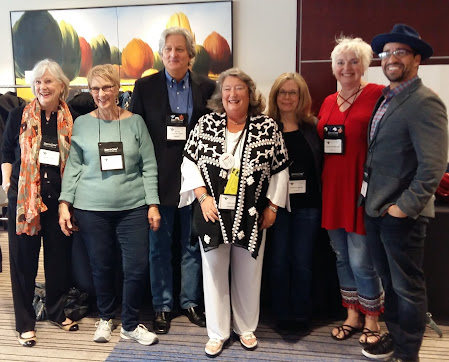How do you decide who to acknowledge and who to dedicate a book
to, and have you ever had an awkward moment in making an “in” or “out”
decision?
The early dedications were easy: Mum and Dad in book one, my husband in book two, then my sisters, my mother-in-law, my three dearest friends, by which time I had moved to the US and restocked with scads more dearest friends and was in no danger of running out. Then came the years on the Sisters in Crime board, the deepening friendships across the mystery community (when we "only" saw each other three times a year. Only. Ha.) and to cut a long story short, as I edit, polish and launch books 29-31, I've still got lots of people I want to honour.
Coming to the UK on 21st Jan
The only regrets I've got - and I'm not even sure that's the right word; source of sadness might be a better way to express it - are that twice I've had to dedicate a book to someone's memory. F died at the age of sixteen a few years ago. I could never have foreseen his death; no one could. And my dear father-in-law was gone long before I had a book published. He was all-in from the start, too - telling me he wanted a good seat at the awards (I couldn't even have named an award then) and joking about Hemingway's life choices. Oh, Jack.
As for awkward moments, I'm having one right now. But a happy one. (More of this below).
To turn to acknowledgements for a while . . .
Sometimes there's a very specific reason to thank a very specific person: an academic called Lee.E.Gray wrote an insanely detailed and unexpectedly riveting monograph on 19th century elevator technology, which saved the plot of AN UNSUITABLE DAY FOR A MURDER; Donald and Ishbel Ferguson of Applecross fed me tea and buns and taught me the local dialect of Gaelic for A STEP SO GRAVE; the Rizzo family let me move into their house and stay there for five months while I wrote THE DAY SHE DIED; Leslie Budewitz was the VP during my stint as SinC president, and without her I would have been a Catriona-shaped hole in the wall, a la Wile. E.Coyote, rather than the author of a couple of books that year, same as ever.
But usually, I hold the acknowledgements down to: everyone at the agency by name; everyone at the publishers, who worked on my book, by name; 'my friends and family in the US and UK'; and Neil.
For my second book, I decided to name this family I was thanking. They were Jean and Jim, and also Amy, Audrey, Callum, Claire, Fraser, Greig, Harris, Iain, Lewis, Mathew, Megan, Ross, Sheila, Tom, and Wendy.
I had the cluelessness to give that list a 'here goes' and a 'phew'.
You see, if I were to do the same thing now, fifteen years on, the list would be:
Jean and Jim, and also Amy Jane, Amy Jenna, Andrew, Angus, Arthur, Audrey, Brian, Brodie, Bogusia, Caitlin, Callum, Catriona, Claire, Colin, Daisy, Donovan, Eilidh, Euan, Fraser, Gillian, Gordon, Greig, Harris, Iain, India, Innes, Isla, Jackson, Jason, Lewis, Lydia, Maisie, Mathew, Megan, Michael, Mollie, Nan, Rory, Ross, Ruby, Sheila (still), Suzanne, Tom, and Wendy. And counting, I hope and trust.
And the friends? If I named them? Well, that would make the family list look sparse.
So. 'All my friends and family' it is.
Now back to that dedication-related awkwardness mentioned above. One of the lovely things about this job/community is that an avid mystery fan becomes an attendee at a convention, catches your panel, and becomes a reader, then a writer of an email, then a Facebook pal, then a fellow late-bedder/early riser to share rants with on Brexit and election nights, and eventually starts to call herself - tongue-in-cheek - a stalker. And so you plot your revenge.
But long before your author copies of the UK version of the book in question arrive for you to sign and send off again, this sleekit besom announces that she's ordered said book from the Book Depository and is expecting it imminently. (To be fair, I do my fair share of BD ordering too.)
So, I've had to resort to this to stay at the helm of the surprise, while an advance order of THE MIRROR DANCE arrives on the east coast before my author copies have a chance of getting over here to the west:





































